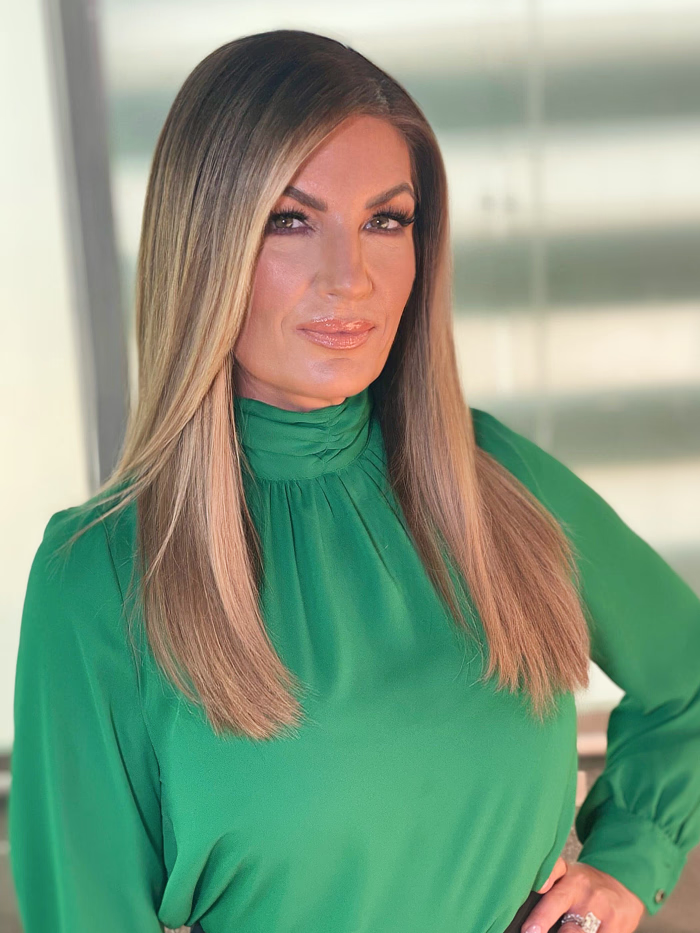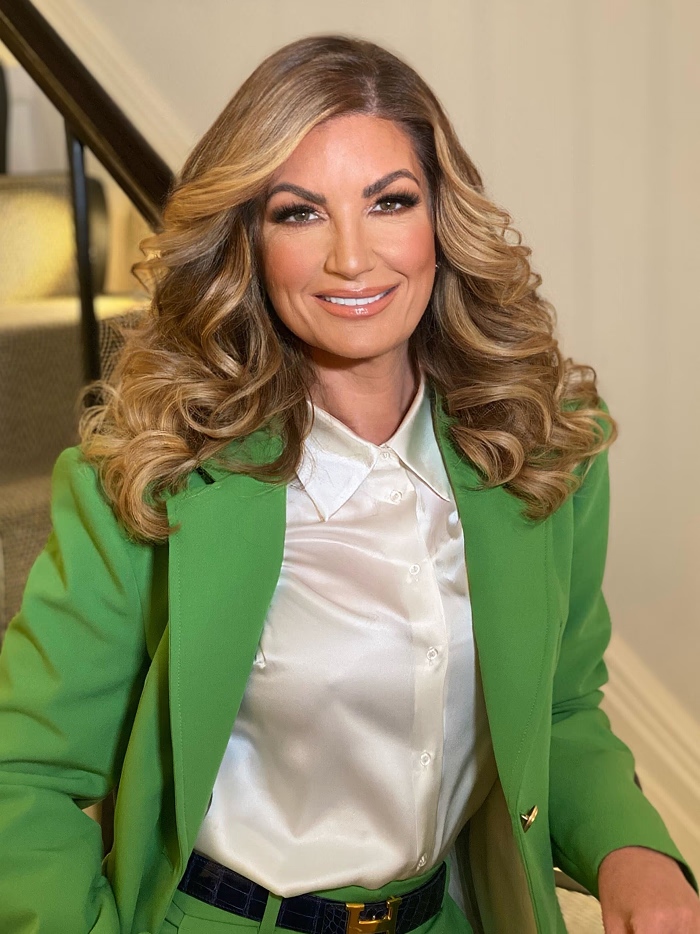2/9/25
The Person You Could Have Been: Lessons from Karren Brady
The Person You Could Have Been: Lessons from Karren Brady
“I saw something in the paper the other day that said: ‘The definition of hell is that on your last day, the person you could have been meets the person that you are.’"
When Baroness Karren Brady shared this haunting concept during her Female Invest webinar, it struck a chord. For her, it's not a thinking exercise - it's a call to action.
"If you haven't lived a whole life seeing what you can be and becoming what you can become, then that could be a terrifying moment," she continued.
Making the most of her potential became the blueprint that transformed a 23-year-old outsider into one of football's most formidable executives.

Today, Baroness Brady is best known as the trailblazing vice-chair of West Ham United - the first woman to run a top-flight English football club and a pioneer for women in the sport.
She's also a star of BBC’s The Apprentice, where her sharp wit and unshakable confidence have made her a British household name.
But long before the boardrooms and the TV studios, she was just a kid who learned the value of independence the hard way.
Key Milestones
- 1969 – Born in Edmonton, London, England
- 1989 – Became a Director at Sport Newspapers
- 1993 – Became Managing Director of Birmingham City Football Club
- 1997 – Led Birmingham City FC to become a publicly traded company
- 2009 – Sold her stake in Birmingham City FC
- 2010 – Joined BBC’s The Apprentice as an advisor
- 2010 – Became Vice-Chair of West Ham United Football Club
- 2013 – Published Strong Woman: The Truth About Getting to the Top; becoming a Sunday Times bestseller
- 2014 – Is honoured with the title Baroness, joining the UK’s House of Lords
- 2014 – Received the CBE award from the Queen for her work helping entrepreneurs and women in business
- 2025 – First partnership with Female Invest!
Let’s take a page from Baroness Brady’s playbook.
The Long Road to Self-Reliance: Brady’s Boarding School Years
Growing up, Baroness Brady learned what it meant to want something for herself. Having spent years at boarding school where every move was rigidly scheduled for her, she came to value independence above almost anything else.
"I left school at 18, and I had one ambition for my whole career. And that ambition was to be independent," she revealed during her Female Invest webinar.
But I realised that you're only truly independent if you have your own money.
"You're not independent if you do not have your own money. And that's something I really focused on.”
The experience of having so little control over her own life during those formative years shaped this conviction - independence wasn't just a vague aspiration, but a concrete goal tied directly to financial autonomy.
Rising Through the Ranks
Baroness Brady didn’t wait for opportunity to knock.
After completing her A-levels, she started her career as a trainee at an advertising agency, then moved to the London Broadcasting Company (LBC). She worked as an advertising account executive, reaching major clients for advertising contracts.
This brought her into contact with David Sullivan, owner of the Daily Sport and Sunday Sport newspapers. Impressed by her drive and results, Sullivan spent over £2 million on advertising with her in just six months.
He offered her a job, and by the age of 20, she had become one of David Sullivan’s directors at Sport Newspapers.

"Well, That's Not Difficult": The Birmingham City Breakthrough
Around this time, she spotted an advertisement in the Financial Times about the sale of Birmingham City FC.
Recognizing a rare opportunity, she set to work convincing Sullivan to buy it and trusting her to run it, despite her lack of prior football management experience.
When Sullivan questioned whether she could handle the role, she famously replied, “Well, that’s not difficult” - a nod to the idea that she would have to be twice as good as a man to be taken seriously.
Sullivan later admitted he agreed partly because appointing a young, female director would attract publicity, but also because she had the drive and determination to succeed.
So at just 23, Baroness Brady was appointed managing director of Birmingham City FC, stepping into the role as the club faced serious financial challenges.
From Struggling Club to Public Company
She didn’t waste a moment.
Baroness Brady rolled up her sleeves and set about transforming the club with a fresh, strategic vision to Birmingham City FC. She modernised operations, struck new sponsorship deals, and used the media to put Birmingham City on the map.
Her determination and innovative thinking turned the club around, securing the trust of her owner and the respect of her peers, all while facing the added scrutiny of being a young woman in a man’s industry.
Four years later, in 1997, she oversaw the club’s flotation on the Alternative Investment Market (AIM), a sub-market of the London Stock Exchange.
This transformed Birmingham City into a public limited company (plc), making her the youngest managing director of a UK plc at the time: a remarkable achievement for anyone, let alone a woman in a male-dominated industry in the 90s.
Her grit was evident at every step: taking on a failing football club, convincing skeptical owners, and steering the business through a complex financial restructuring.
When doors slammed in her face, she found an open window to crawl through, determined to be where others said she didn’t belong.

Standing Firm in Football’s Boys’ Club
Baroness Brady didn’t just break into the boys’ club. She rewrote the rules.
But as she stepped into the spotlight, the spotlight wasn’t always kind.
At her first press conference, after delivering a serious business pitch, a journalist asked for her “vital statistics.” Not the club’s. Hers.
It was a moment that crystallised the challenges she would face as a woman in a male-dominated industry.
Her career has been punctuated by these kinds of encounters. There was the infamous team bus incident, where a player remarked, “I can see your tits from here.” Her response? “Well, if you’re lucky, that’s the closest you’ll ever get to them.”
She wasn’t just fighting for her place. She was fighting for every woman who would come after her.
Where others might have stepped back, she leaned in.
The misogyny sharpened her resolve, and she became the first woman to manage a top-flight English football club.
"Ambitious People Aren't Ruthless"
For Baroness Brady, understanding and embracing her core values early in life provided the foundation for everything that followed.
"Core values are the things that make you who you are. They're the personality traits that drive you on. They're the reasons why you make certain decisions," she explained during her Female Invest webinar. "And I had worked out that for me, I was ambitious."
She doesn't shy away from that word, "ambitious" – a term that many, especially women, have been conditioned to avoid.
"People are very often scared to say they're ambitious, because we tend to think that ambitious people are ruthless people. And actually, nothing could be further from the truth. Ambitious people are people that just won't settle for anything other than what they want."
For Baroness Brady, ambition isn't about climbing over others, it's about curiosity and courage to chase your dreams.
"I wanted to see how far my career could go. And a bit like most people on this webinar, you won't know how good you are at something until you try. And then you'll really know how good you are at it."
This unapologetic ambition, coupled with what she describes as her second core value – determination – created the foundation for her groundbreaking career.
It's what pushed her to take that leap into football management at 23, to face down skeptics and critics, and to continuously seek new challenges rather than rest on her laurels.
In Baroness Brady’s worldview, ambition isn't a character flaw. It's the engine that drives potential into reality.
The Setback Playbook: How to Fail Forward
Success isn’t a straight line, and she knows this better than most.
She’s spoken openly about the setbacks she’s faced, from failed deals to tough decisions and moments when it felt like the world was against her.
“Before success, you get temporary defeat or failure. It’s about how you cope with that.”
So what happens when things don’t go to plan? Baroness Brady’s approach is practical: she surrounds herself with people who challenge and support her, and she’s not afraid to ask for help when she needs it.
“You have to live every day with some sort of energy and positivity,” she’s said. “And accept that nothing goes right.”
Failure isn’t the end, it’s just part of the process. It’s about picking yourself up, dusting yourself off, and getting back in the game.

No Women on the Board? Ask Why.
While Baroness Brady is best known as a business executive, she’s also a badass investor and advocate for women in leadership.
Inclusivity is a cornerstone of her decision-making,.
She follows a simple investing rule: look for companies with women on the board.
If they don’t have any, ask why. If the risk is higher, do your research. If you’re not sure, ask more questions.
"Equal pay, women on the board, all of those things are particularly of interest to me. I mean, I wouldn't invest in any company, no matter how good they were, if they didn't have women on their board. I think that to me is a really clear indication of the values and the purpose of that kind of organization.”
She believes diverse leadership isn’t just a moral imperative - it’s a smart investment.
And she’s right: research from McKinsey shows that companies in the top quartile for gender diversity on executive teams are 27% more likely to outperform financially than those in the bottom quartile.
Morgan Stanley’s analysis of 1,875 global firms also found that companies with greater gender diversity outperformed less diverse peers by 1.6% in share price performance in 2022.
Living With Intention: The Brady Blueprint
If Baroness Brady’s journey teaches us anything, it’s that living with intention beats living with regret every time.
Financial capital is only part of the equation.
The real return comes from backing yourself - whether that’s building new skills, stepping into leadership, or gaining the confidence to make bold decisions.
In Brady's world, potential isn't theoretical - it's practical. It's not about an imagined future self, but about who you actively become through daily choices, persistent effort, and unwavering self-belief.
The gap between who you are and who you could be isn't bridged by wishful thinking, but by decisive action. As she puts it:
"You've got one life. You've got one chance to take as many opportunities out of that life and live it to the fullest."
We want to hear from you: what’s the boldest step you took toward your dreams?
Sources:
- https://www.mckinsey.com/featured-insights/diversity-and-inclusion/diversity-matters-even-more-the-case-for-holistic-impact
- https://www.morganstanley.com/ideas/gender-diversity-investment-framework

